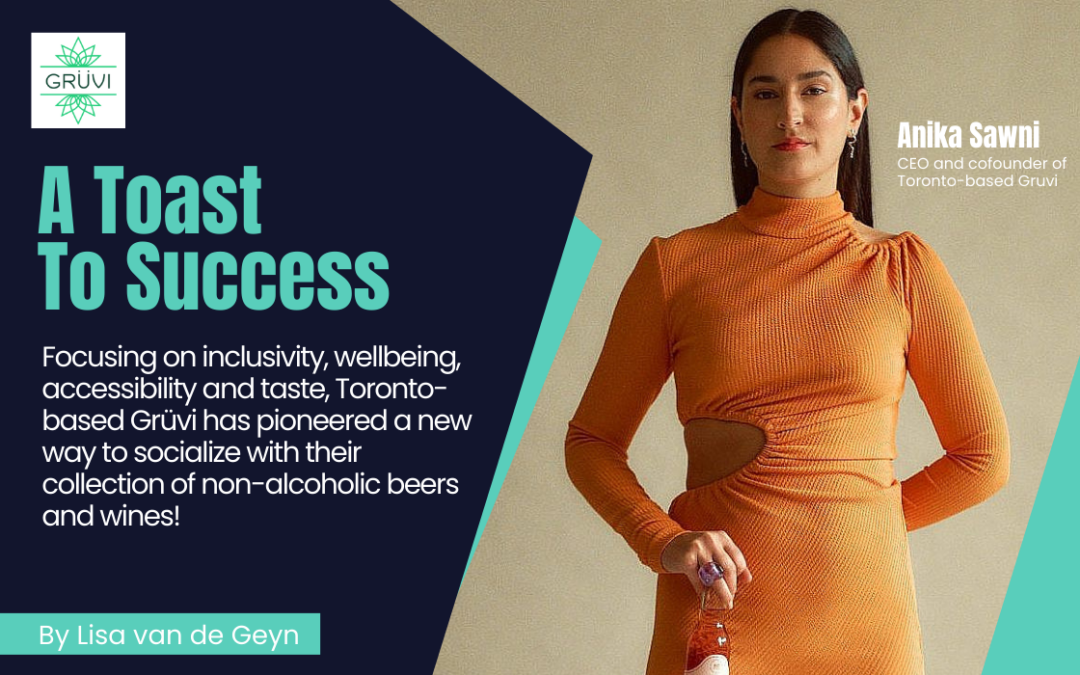Focusing on inclusivity, wellbeing, accessibility and taste, Toronto-based Grüvi has pioneered a new way to socialize with their collection of non-alcoholic beers and wines that taste pretty much identical to the real deals. Enjoy your evening, skip the hangover. We’ll drink to that!
Wine aficionados can be a fickle bunch. While some simply answer “red” or “white” when offered a glass, many are well-versed in tannins, complexity and even favour certain vintages. The same goes for beer drinkers. Some will sip whatever’s on tap, while others are fervent about their English IPAs or bitter stouts. Either way, these drinkers have something in common—while they enjoy the taste of these beloved adult beverages, they aren’t always in the mood (or situation) for alcohol. And while the thought of consuming alcohol-free versions of these libations haven’t appealed to the masses in the past, things are different now. Today, there’s a plethora of reasons why folks don’t fancy alcohol every time they dine out, host guests or go to a party. There’s also a growing population interested in the “sober curious” movement—they’re tired of the pressure to drink and want to cut back for personal reasons.
Before Grüvi—a Toronto-based startup that launched in 2019—alcohol-free wine and beer wasn’t considered cool. “Actually, non-alcoholic beer was probably the most uncool thing you could drink,” says Niki Sawni, who founded the company with his sister, Anika. But their award-winning collection of drinks that basically taste the same as the classic pale ales, nitro stouts, bubbly rosés, dry red wines and sangrias you’d pick up at the liquor store have impressed both those who enjoy the occasional drink and those who avoid the hard stuff. Their products are available across Canada in Loblaw stores (as well as in 3,000 stores locally, including Sobeys and Farm Boy), in liquor stores in some provinces, and in 20 states south of the border, and have received rave reviews. “There’s more appeal to try non-alcoholic drinks now because, for the first time, it’s cool,” he says.
The Backstory
Sawni has a long entrepreneurial history—he participated in summer entrepreneur programs for students and started businesses through high school and university. Grüvi isn’t his first foray into beverages. “I’d buy one-litre jugs of chocolate milk when they were on special for $1 each. I’d pick up 30 or 40 jugs, bring them to school and sell them for $3. I always had a locker full of chocolate milk,” he says. Another venture involved selling used furniture on online marketplaces. These enterprises inspired Sawni to study business before learning the ins and outs of sales at Salesforce. “I knew I wanted to start my own business, so I spent a year evaluating new ideas. That’s when I came across insights around the non-alcoholic market. It had really taken off in Europe—my mother is German and Germans drink non-alcoholic beer regularly; it wasn’t stigmatized there like it is in North America,” he says. Sawni and his sister (she had a degree in neuroscience and lived a sober lifestyle) perused the idea, looked at companies who were doing it across the continent and decided to start their own shop to address the industry’s challenges—alcohol-free drinks have been taboo, and they have a dismal reputation when it comes to taste. (Read: All non-alcoholic wine tastes like grape juice.) At the same time, cannabis had just been legalized in Canada, and the idea that alcohol-free versions of beer and wine could be popular for people who indulged in grass was noteworthy. “There were a lot of hurdles for people to try these drinks, including the preconceived notions of them not tasting good, as well as the lack of selection and availability,” he says. “That’s why we built Grüvi on these pillars: Taste, variety and accessibility.”
The Products
The Sawni siblings launched with two beers and one wine—they opted for single-serve products that would be easy to consume and aimed to get onto grocery and liquor store shelves, and pretty much anywhere else you can get a drink. Their goal was to make these reproduced beers and wines taste as close to their alcoholic counterparts as possible. “Neither of us have a background in this, so we spent a lot of time first finding brewers and winemakers who were willing to be associated with non-alcoholic versions, then working on research and development with these experts,” he says. While their beer is indistinguishable from regular brews, their wines continue to evolve. “There’s new technology every day. We’re currently working on closing the wine gap when it comes to flavour, and we’re investing heavily in new processes companies weren’t applying to this category before,” says Sawni.
“We called the company Grüvi because it’s fun. ‘Groovy’ was a used a lot in the ’60s—it meant cool, far out, outstanding. We wanted to take that positive association with that name and bring it to category that was almost the exact opposite.” – Niki Sawni, Grüvi cofounder
The Angel Investor Journey
The duo first approached friends and family for funding, as is typical for startups. “You reach out to everyone you know to chip in. This got us to a point where we had a product, maybe a million in sales and some traction around the idea,” he says. The first angel group to support Grüvi was Maple Leaf Angels in Toronto. “A few investors joined initially, then looped in others. From there we were introduced to Women’s Equity Lab, the connected with Keiretsu Forum Canada. It was nice to get our foot in the door and find people who believed in us.” Today, the company has almost entirely been funded through angels. “They’ve been pivotal not only in capital, but we now have more than 100 people who have opened their networks to help us. We have one angel—the former CEO of a major food company—who has mentored us for the past three years. We talk every other week about strategy, and he brings us experience, credibility and even other investors.”
The Future
There’s lots to be excited about right now—including expansion nationwide with Whole Foods, meeting with major sports-and-entertainment companies, the growing interest from restaurants and bars, as well as the shift in consumer mindset—but Grüvi’s wines top Sawni’s list. “I’m pumped about closing the gap. When we unlock that and our products are indistinguishable from other wines, it will open us up to many more consumers,” Sawni says. “We’re bringing positive emotions to an under-loved and underserved category, and it’s really cool to see how it’s grown over time. That’s what’s great about being an entrepreneur—it’s not just a straight path. The journey of ups and downs is what really keeps me motivated, encouraged and excited.”
Q&A with Sally Morris, Grüvi angel investor
Q: How long have you been an angel investor?
A: I’ve been angel investing since 2019 when I retired from my career in banking. I’ve been a member of Maple Leaf Angels in Toronto since 2020—COVID hit, and I realized I couldn’t do this on my own without a group.
Q: What impressed you about Niki and Anika? Why were you interested in investing in Grüvi?
A: I loved the Grüvi story and particularly fell in love with their products. A deciding factor for me to invest was a conversation with a brand specialist who’s one of their advisors and on their board. He convinced me that Grüvi has what it takes to be a brand capable of generating millions in revenues. He also mentioned he has a regular call with Niki and finds him very coachable—I believe that’s an important characteristic of a founder. We also had an interesting conversation with their distributor, Well.ca; they were very keen on the product and the category.
Q: Grüvi is an interesting company because it offers a retail product—it’s not an innovation in medtech, agtech, cleantech, etc. What excited you about it?
A: Grüvi is certainly my most fun investment because I interact with the product regularly. Most of my investments are more technical, so it’s fun to invest in a product I love. My husband and I sampled all the products and we have been very impressed—I love the Bubbly Rosé and he loves the Golden Lager. We’ve also had a great time introducing it to friends and family.
Q: Since investing, have you assisted the siblings when it comes to networking, mentoring or in any other ways?
A: Yes, I’m on the advisory team and a managing partner of Women’s Equity Lab, and I introduced Grüvi—they did a great presentation at one of our meetings (Niki was virtual and Anika was live with samples!). The fund invested. Women’s Equity Lab is a fund established to promote female angels and all the limited partners (LPs) are active in investment decisions. We love to help our investee companies and Grüvi was delighted to receive several intros from our LPs.
Check out Gruvi’s website here or follow them on social media below!
Interested in becoming part of the dynamic angel investor community in Ontario? Explore our wide network of supported Angel Investor Groups. Discover your local group with the details provided on our website. Get involved and start making an impact today!
👉 Find a Group Here
Success Story was written by Lisa Van De Geyn

Lisa van de Geyn is a self-proclaimed magazine junkie and more-than-20-year veteran in Canada’s magazine industry. The multi-award-winning writer and editor has worked for many of the country’s most venerable publications, including Chatelaine, Canadian Living, Today’s Parent, House & Home, Toronto Star, Reader’s Digest, CAA Magazine and Globe & Mail. She’s been covering the fascinating stories of angels and founders for several years, working with Spark Centre, NACO, Access IO, Capital Angel Network, and Angel Investors Ontario (she served as editor-in-chief and feature writer of [XV].
Lisa is a mom to two teenagers and is very fond
of her many streaming services.
